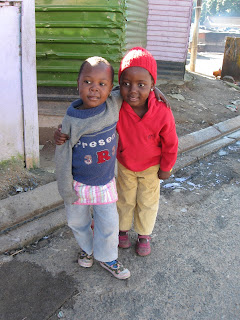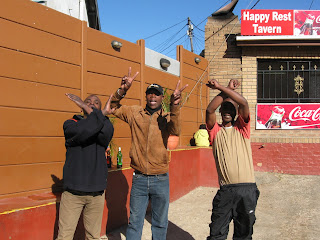It seems like everyone in Kayamandi knows Matiba, as he spoke to almost everyone we passed as we walked around the township. They come to him for advice on many matters in their lives. He seems to be very well respected.
Everyone I spoke to in Kayamandi was very friendly. Many, before they even saw my camera, came up to me and asked for me to take their picture, and then they wanted to see the picture I had taken of them. They seemed to assume that because I was white, that I was a tourist, and because I was a tourist, that I had a camera. Both kids and adults alike asked me to take their picture, as seen in my pictures below. Most of the kids were kind of shy about asking me - it was cute. :)
Matiba took me to an area of Kayamandi where they are building new houses. People get on a waiting list and the government provides them with homes as they are built. The problem is that some families are on the waiting list for years. This is a problem all around South Africa. There simply isn't enough housing. Matiba is involved with a campaign that advocates the construction labor for building the new houses comes from the township itself, thus creating more jobs for the residents. 38% of Kayamandi residents are unemployed. My concern is that the simple act of providing people with decent housing, though a good start, will not truly solve the problems. There are still not enough jobs for the people. And even those who get involved with construction work on the new houses, there is no promise that that work will be ongoing in the future.
Kayamandi had a good mix of shacks, former labor hostels converted to homes, construction homes from the 1960s onward, and all were in various states of repair. Some of the houses were in very good condition and might be similar to something you'd see in the US, only they were quite small. Even Matiba's house, which was one of the nicest ones, was very small. Most of the homes do not have access to running water or electricity. There is a municipal water pump that people haul water from for washing clothes, bathing, and cooking. Shortly after I got to Kayamandi with Matiba, in the middle of the day with people all around, a man came out of his shack to relieve himself in the street. That's very common, Matiba says, and no wonder since the people don't have properly-constructed homes, much less plumbing. There is a combination of paved streets, narrow pathways between shacks (see picture below), and dirt roads. Cars are actually pretty normal.
It's sad that people have to live like this due to the unavailability of proper housing, but the people seem to have adapted to their environment as best they can. Everyone I met seemed friendly, and the community was very active.

In first world countries, I'm sure this would be prime real estate land since it has amazing views of the mountains of Stellenbosch. Who knows? The township may be cleared and residents evicted to make way for new, high-class homes.

Guy pushing a shopping cart full of crates of beer. Uphill, mind you!

Women hauling water from the township's pump since they have no running water in their home.

There were many people walking on the main road to/from Stellenbosch since it was a Sunday afternoon.



Grassroots kindergarten that Matiba and his wife run.



Following Matiba through the labrynth of shacks.

These kids were so cute. :)




This woman was preparing hops over the fire for homebrewed beer, a special tradition in the townships.


Another step of the home brewing process. I think the hops were being strained. It takes about 24 hours.

2 comments:
Well at least one of us got to go to a brewery this week ;) You have to tell us how that stuff compares to our native MN brews.
The township reminds me of the favelas in latin america. Do most people there own the land they live on??
No. The homeowners of the "real" houses also own the plot of land that their house is on, but the government owns most of the land that the shacks are on. That's why the government is able to evict people as they please, which they have done.
There are also "backyarders" or people who have built shacks in the backyards of the "real" houses, often their family members who moved here from elsewhere and can't find their own good housing.
Post a Comment